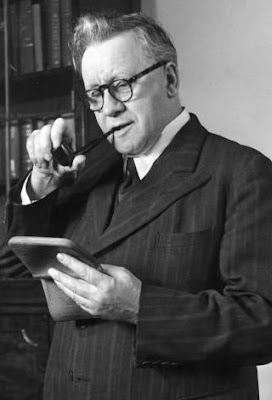
Herbert Stanley Morrison, Baron Morrison of Lambeth was a British Labour Party politician.
Morrison held various Cabinet posts, including Home Secretary, Foreign Secretary and Deputy Prime Minister. Morrison was close to attaining the leadership of the party at various points in his career.
Morrison was the son of a police constable and was born in Lambeth, London. As a baby he lost the sight in his right eye due to infection. Morrison, like many early Labour leaders, had little in the way of formal education and left school at 14 to become an errand boy. Morrison's early politics were radical, and he briefly flirted with the Social Democratic Federation over the Independent Labour Party (ILP). As a conscientious objector, he worked in a market garden in Letchworth in World War I. Morrison eventually became a pioneer leader in the London Labour Party.
Morrison was elected to the Metropolitan Borough of Hackney in 1919 when the Labour Party won control of the Borough. He was Mayor in 1920-21. Morrison was also elected to the London County Council (LCC) in 1922 and the following year he became MP for South Hackney in the 1923 General Election, but lost that seat the following year when Ramsay MacDonald's first administration lost the general election.
Morrison returned to Parliament in the 1929 general election, and MacDonald appointed him Minister of Transport. Morrison, like many others in the party, was deeply disheartened by MacDonald's national government. Morrison lost his seat again in 1931.
Morrison continued to sit on the London County Council and in 1933 was elected to lead the Labour Group. Unexpectedly, Labour won the 1934 LCC election and Morrison became Leader of the Council. This gave him control of almost all local government services in London. Morrison's main achievements in London included the unification of the transport system and creating a 'green belt' around the suburbs. He confronted the Government over its refusal to finance the replacement of Waterloo Bridge, and eventually they agreed to pay 60% of the cost of the new bridge.
Morrison is often credited as saying that he would "build the Tories out of London", ie. build enough council housing to ensure Labour a solid majority of Labour voters, the opposite intent to that attributed to Westminster Council under the leadership of Shirley Porter in the 1980s. Morrison's biographers Donoughue & Jones insist that the quotation is apocryphal.
In the 1935 election Morrison was once again elected to the House of Commons and immediately challenged Clement Attlee for the leadership of the party. He lost badly, a defeat ascribed to his unfamiliarity with the MPs who had served in the previous Parliament. Both he and his supporter Hugh Dalton put some of the blame on the masonic New Welcome Lodge, who they claimed backed the third place leadership candidate Arthur Greenwood and then switched their votes to Attlee. After losing, Morrison concentrated on his LCC work.
In 1940 Morrison was appointed as first Minister of Supply by Winston Churchill, but shortly afterwards succeeded Sir John Anderson as Home Secretary. Morrison's London experience in local government was particularly useful during the Blitz, and the Morrison shelter was named after him. However, Morrison had to take many potentially unpopular and controversial decisions by the nature of wartime circumstances.
In 1943, Morrison ran for the post of Treasurer of the Labour Party, but lost a close contest to Arthur Greenwood.
After the end of the war, Morrison was instrumental in drafting the Labour Party's 1945 manifesto Let us Face the Future. He was the organiser of the general election campaign and enlisted the help of left-wing cartoonist Philip Zec with whom he had clashed during the early stages of the war when, as Minister of Supply he took exception to an illustration commenting on the costs of the supplying the country with petrol. Labour won a massive and unexpected victory. Morrison was appointed Deputy Prime Minister and Leader of the House of Commons. In this capacity Morrison was the chief sponsor of the Festival of Britain. After Ernest Bevin's resignation as Foreign Secretary, Morrison took over his role, but did not feel at ease in the Foreign Office. His tenure there was cut short by Labour's defeat in the 1951 general election.
Although Morrison had effectively been Attlee's heir apparent since the 1930s, Attlee had always distrusted him. Attlee remained as Leader through the early 1950s, and fought the 1955 election, finally announcing his retirement after Labour's defeat. Morrison was 67 and was seen to be too old to embark on a new leadership. Although he stood, he finished bottom - by a wide margin - of the three candidates, with many of his supporters switching to Gaitskell. Hugh Gaitskell won the election, and Morrison resigned as Deputy Leader.
Morrison stood down at the 1959 general election and was made a life peer as Baron Morrison of Lambeth, of Lambeth in the County of London. He was appointed President of the British Board of Film Censors.
He died in 1965, symbolically in the same month as the London County Council was abolished.

No comments:
Post a Comment